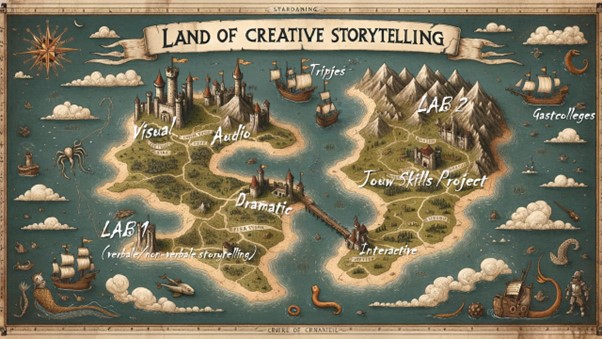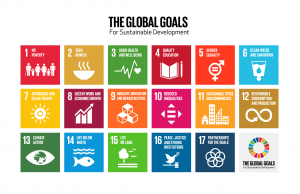Are you interested in mastering the art of designing and crafting stories in a creative and impactful manner? Would you like to acquire the skills needed to create narratives that resonate deeply with your audience? If so, this minor is precisely what you’ve been searching for.
Stories take on a multitude of forms, ranging from film, documentaries, podcasts, and books to theatre, comics, animations, TED talks, music, games, and works of art. The ability to convey your message or story in a creative and compelling way holds immense value across virtually every professional field. The influence of storytelling is pervasive, making its mark in the realms of communication, journalism, education, media design, advertising, therapy, business, the creative industries, and social work.
A well-crafted story possesses the power to fully immerse its readers, viewers, or listeners within its narrative world. Through this immersion, you can establish emotional connections, ignite motivation, inspire, and even catalyze changes in people’s behavior. In this minor program, you will delve into an array of creative storytelling techniques that will equip you with the tools necessary to achieve your storytelling goals.
This minor is also offered in Dutch under the name Creative Storytelling.
Admission
No specific prerequisites are required to enroll in this minor, and prior knowledge is not necessary. Additionally, there is no need for an internship or a specific workplace to participate in this minor. We value curiosity, motivation, and a genuine interest in storytelling as the key qualities for success in this program.
You cannot participate in this minor program as a part-time student or as a flex student.
The Examination Board determines which minors do not have a higher professional education level and/or have an unacceptable overlap with the compulsory curriculum of your own study programme. Check at the page Not allowed minor courses under your institute which minors are not allowed. This page will be updated from 29 February 2024 for the 2024-2025 minor offer.
Content
Prepare to embark on an immersive journey into the realm of creative storytelling, also referred to as narrative communication. You will acquire a diverse toolkit of techniques drawn from the realms of cinema, theatre and literature enabling you to craft and creatively mold your very own narratives. Throughout your journey, you’ll also discover how music can enhance the impact of a story and how to convey compelling narratives through the medium of audio. You will embrace the role of an author, immersing yourself in the realms of creative writing, storytelling, attentive listening, and physical expression. Furthermore, you will gain insights into the powerful art visual imagery, learning how to effectively convey your narrative through the use of compelling visuals.
You will gain the expertise to deliver impactful narratives. Learn how to package your message within a compelling story, captivate your audience’s attention, inspire, create emotional resonance, and foster interaction with your viewers or listeners. The stories you choose to work with in this minor program are entirely up to you; they can be inspired by societal issues, or drawn from your personal experiences. This program offers ample opportunities for you to showcase your unique interests and strengths. In our classes, you will receive both pertinent theory and practical techniques, enabling you to creatively and artistically shape stories, and master the art of dramatization.
In this minor you will work together with students from all kinds of bachelors, both from the HU and from other universities of applied sciences.
Learning objectives
Hands-on experience takes center stage in this minor course, as practical application is the cornerstone of our approach. Storytelling is a versatile skill that finds relevance in virtually every profession, including the one you are currently studying for.
In this program, you will acquire a wide range of skills, including:
- The art of developing impactful story concepts and creatively shaping them through various mediums such as imagery, text, audio, voice, decor, lighting, and body movement. Throughout the course, you will produce several compelling stories.
- Utilizing visual, theatrical, auditory, and narrative techniques to construct and mold narratives, enriching your storytelling repertoire.
- The refinement of your creative writing abilities and the honing of your narration skills, enabling you to convey your narratives effectively.
- A comprehensive understanding of the role of audio and music in enhancing various story formats, unlocking the potential to infuse emotion and depth into your storytelling.
Courses
Art of Storytelling (Visual, Audio and Dramatic)
In this course, you will immerse yourself in the world of storytelling, exploring its nuances across various mediums, including theatre, film, music, and drama. We will examine how creative minds have shaped narratives, dissecting the techniques they employ to build tension and evoke emotions. Our journey will take us to a live theatre performance and you will experience a film festival or other sources of inspiration like stand-up comedy and poetry slams. Furthermore, you will gain expertise in developing story concepts infused with robust themes, compelling plots, and memorable characters. You will then learn to translate these concepts into imaginative and engaging story formats. As part of this course, you will actively produce these story forms, enabling you to build a diverse portfolio throughout the program.
Storytelling LAB 1
You will immerse yourself in the ‘Storytelling Lab,’ conducting specialized experiments that delve into themes, characters, structure, music, suspense, space, and time. Your journey will involve narration, performance, writing, and improvisation, cultivating your ability to think creatively and convey your story to elicit emotions from your audience. These skills will be honed on the stage floor, enhancing both your verbal and non-verbal storytelling techniques. Ultimately, alongside your fellow students, you will present a theatrical storytelling production to a live audience.

Storytelling Skills
Project work in the second half of this minor course will provide you with hands-on experience in applying storytelling concepts in practical settings. Your unique interests and preferences will be at the forefront during this phase. This is your opportunity to further enhance your storytelling skills. Your final project could take various forms, such as a short film, documentary, animation, illustrated (children’s) book, podcast, comic, audio-story, commercial, campaign, music video, educational narrative, live performance, film screenplay, or even a corporate storybook.
In addition to your individual project, you will continue to refine both your verbal and non-verbal communication skills. Collaborating within a team, you will work towards a performance centered around a theme of your choice. Throughout the minor, we will also host guest speakers, providing insights and inspiration from their experiences in the world of storytelling. Additionally, you will have the opportunity to have a short dive into the realm of interactive storytelling.
Click the project website button to see examples of students’ final products and to find out more about this minor course.

Assessment
Throughout this course, you will engage in both individual and collaborative projects focused on practical storytelling. We understand the importance of fostering your creative autonomy. That’s why this minor course offers you considerable freedom of choice, allowing you to curate a diverse portfolio that showcases your talents and personal growth in the realm of storytelling.
Literature
The following literature will be used in this minor. You will receive a definitive required reading list before the start of the course.
- The Anatomy of Story. 22 Steps to Becoming a Master Storyteller (Truby)
- Story Structure Architect (Schmidt)
- 36 Dramatic Situations (Polti)
- An overview of narrative techniques (Kisak)
- Various articles from the narrative field of dramatic/visual/audio/interactive storytelling
Schedule
In the initial phase of the minor, there are typically three scheduled contact days per week, and during the subsequent phase, there are two scheduled contact days per week. As this is a full-time minor, the remaining days are dedicated to independent work on your projects, either individually or in group settings.
With the exception of the first teaching period of the academic year (starting September), the lesson and test schedules are always posted on Mijn Rooster four weeks before the start of each teaching period. The schedule for the first teaching period of the academic year can be found on the site three weeks before the start. The most up-to-date schedule is always visible on Mijn Rooster.
At HU, full-time education may be scheduled between 08:30 and 19:00.
Additional costs
You have the means to occasionally visit a theater, museum, or other performance.
 This minor is marked by the Green Office as a sustainable minor. This means that by participating in this minor course, you can contribute to one or more of the Sustainable Development Goals from the UN.
This minor is marked by the Green Office as a sustainable minor. This means that by participating in this minor course, you can contribute to one or more of the Sustainable Development Goals from the UN.